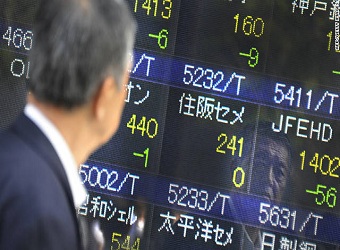Asian equities were mixed in Monday trade on the back of heightened geopolitical tensions after a missile strike on a Syrian airfield last Friday and a move by the U.S. military to send an aircraft carrier group near the Korean Peninsula in response to recent provocations by North Korea.
North Korea responded to the U.S. strike on a Syrian airbase by stating that it was a justification for its own nuclear weapons program, adding that it had to protect itself against Washington’s reckless moves for a war.
A U.S. Navy strike group is expected to move closer to the Korean peninsula following North Korea’s multiple nuclear missile test launches.
The news did not weigh on Japan’s benchmark Nikkei 225 index, which bounced 0.65 percent. Japanese automakers were higher on the back of a weaker yen, with Mazda Motor leading gains and up by 3.23 percent.
Suzuki Motor was higher by 1.95 percent at 4,603 yen a share. “While the shares have come a long way … we think they remain attractive at the current level, in light of the prospects for longer-term demand growth in India and the rock-solid dealer network Suzuki has build there, the company’s low risk-weighting to the U.S. market, and global sales trends,” Citi’s Arifumi Yoshida, Yingqiu Zhang and Manabu Hagiwara said in a note.
Likewise, the ASX 200 was higher by 0.73 percent, driven by its financials, materials and utilities sub-indexes.
In corporate news, miner Rio Tinto paid $4 billion in taxes and royalties last year after it was ordered to pay an extra $284 million with interest due to its operations in tax-friendly destinations.
The news comes as the Australian Taxation Office pays greater attention to the amount of taxes paid by multinational corporations based in Australia.
Rio Tinto was up by 1.52 percent and trading at A$60.95 a share.
The Kospi was down by 0.79 percent, with China-exposed stocks pressured following heightened tensions in the Korean peninsula.
Shares for Lotte Shopping, the retail arm of conglomerate Lotte, fell by 2.04 percent, while shares of LG Electronics plunged 2.82 percent.
Shares of LG Display, LG Corporation’s LCD manufacturing arm, popped 1.17 percent on a reported offer from Google to invest $1 trillion won ($880.29 million) to increase organic light-emitting diode (OLED) screen production for Google’s Pixel smartphones, the Electronic Times said.
LG Display did not respond to an email request for confirmation about the investment.
Mainland Chinese markets traded lower, with the Shanghai Composite declining 0.22 percent and the Shenzhen Composite 0.534 percent lower.
Hong Kong’s Hang Seng Index reversed its losses earlier in the session and was higher by 0.13 percent.
The dollar was higher against a basket of currencies at 101.300 at 11:18 am HK/SIN time, its highest level in nearly three weeks.
The dollar/yen traded at 111.43, higher compared to levels around 110.86 seen last week while the Aussie was softer at $0.7480, versus the $0.76 handle seen last week.
On the energy front, Brent crude was up 0.13 percent at $55.31 a barrel while U.S. crude was higher by 0.23 percent to $ 52.36 a barrel.
In Japan, the February un-adjusted current account balance surplus jumped to the largest since March 2016 at 2.814 trillion yen, compared to 2.616 trillion yen seen.
Other economic data expected today includes outstanding loan growth for the month of March from China later in the day.
Stateside, U.S. equities closed flat, with the S&P 500 shedding 0.08 percent to 2,355.54 points, the Dow Jones industrial average tracking lower by 0.03 percent to close at 20,656.10 and the Nasdaq down by 0.02 percent to finish at 5,877.81.
This was also on the back of a mixed jobs report, which saw just 98,000 jobs added in March, below expectations of 180,000 new jobs.
“Now that the U.S. nonfarm payroll is over, traders are going to put their focus back on the Fed, who have been talking about winding down their balance sheet. The Fed need to be very careful in their approach of conveying their message while they release their purchased bonds back on the market,” Think Markets chief market analyst Naeem Aslam said in a note.
Source: CNBC
